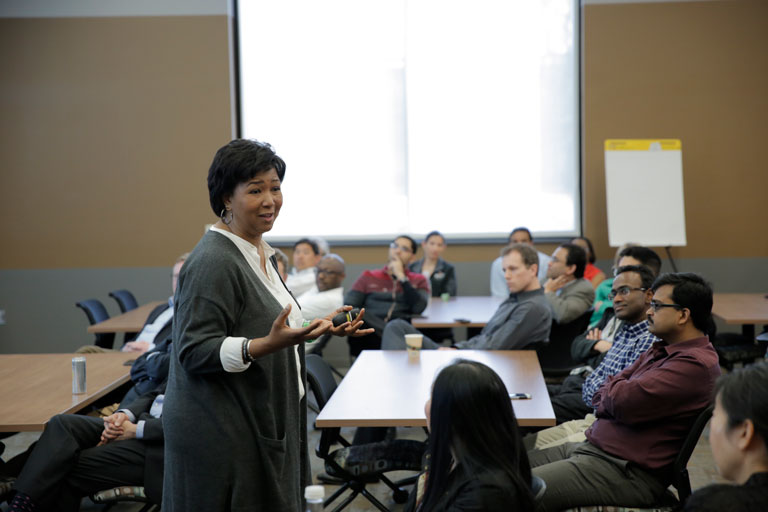Pursuing the extraordinary. That was Dr. Mae Jemison’s subject for the April installment of the Kelley Business of Medicine Physician MBA Program Lecture Series.
Jemison, an astronaut, physician, engineer, entrepreneur and educator, is serving this academic year as the Kelley School of Business Poling Chair of Business and Government.
The first African American woman in space, Jemison served six years as a NASA astronaut. She is currently leading 100 Year Starship, an initiative funded by the Department of Defense’s Defense Advanced Research Project Agency to ensure the capabilities for interstellar human travel exist within the next 100 years.
“Why do I talk about pursuing the extraordinary?” Jemison asked the Kelley Physician MBAs. “Because it creates a better world today. It’s by pushing ourselves beyond what we know that we get to a better world.”
So, she explained, let’s try interstellar. Going beyond our solar system to another star.
“Space isn’t just for rocket scientists and billionaires,” she said. “We want an inclusive, audacious journey to transform life on earth and beyond.”
“We have to figure out how to address the unknown. That’s what makes it so cool. And that’s what makes it so difficult,” she added. “It’s by pushing ourselves beyond what we know that we get to a better world.”
Thinking outside the box is just what these physician MBAs are looking to do in their own careers, as they work to use business knowledge and skills learned in the Kelley Business of Medicine Physician MBA Program to help them navigate through the changing world of healthcare as we know it.
Jemison asked the physician MBAs to think about the health capabilities and the minimum requirements that would be needed to support human interstellar travel. Consider the need to generate a tremendous amount of energy and the need to create an autonomous system that keeps people healthy and whole over a long period of time, for example.
“Just imagine if we were able to go a small step of the way toward controlling that kind of energy and storing it—and what it would mean for life here on earth,” said Jemison.

After discussing in small groups, the physician MBAs presented their ideas, including maximizing food and water over many years, managing waste, considering reproduction, the aging process and new fuel energy sources.
“The reason we do this—to pursue an extraordinary tomorrow—is all about creating a better world today. While it’s about achieving human interstellar flight capabilities in 100 years, it’s really about enhancing life here on earth,” Jemison explained.
“Listening to Dr. Jemison speak about space and the potential for human interstellar travel encouraged our physician MBAs to think even more radically about innovation and to push further beyond their typical boundaries,” said Phil Powell, associate dean of academic programs—Indianapolis and the course instructor for the Business of Medicine Physician MBA Program Lecture Series.
“It was an immeasurable honor to meet Dr. Mae Jemison,” said Cheryl Wolfe, MD, MBA’17. “She is a brilliant physician, dynamic innovator and transformational leader. She challenges all of us to be disruptive thinkers—stretching our convictions and seeing the possible in the impossible. Dr. Jemison is truly an inspiration.”
Jemison founded two medical technology companies, including technology consulting firm The Jemison Group, Inc., which explores and develops stand-alone science and technology programs and companies across the globe. She is also very involved in science literacy, STEM education and teacher training.
Dr. Jemison received her MD from Cornell University, and she served as an Area Peace Corps Medical Officer for Sierra Leone and Liberia, overseeing the healthcare system there for two and a half years. She has worked internationally at a Cambodian refugee camp and with the Flying Doctors of East Africa.
Her current project, 100 Year Starship, received its seed grant in 2012. Jemison says it’s not about setting a launch date, but rather about putting in place the environment and innovations to do that.
She quoted astronaut Eugene Cernan in her closing remarks, “Cernan said, ‘We went to explore the moon, but in fact we discovered the earth.’
“So the question I would ask you today is: What would we discover from another star?”
Leave a Reply